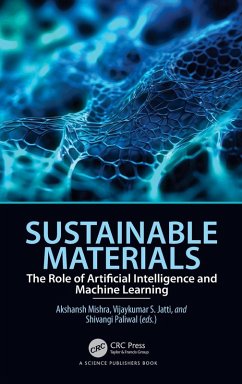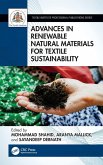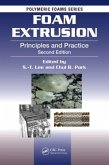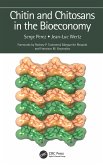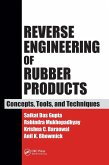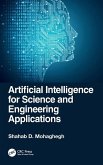Sustainable Materials
The Role of Artificial Intelligence and Machine Learning
Herausgeber: Mishra, Akshansh; Paliwal, Shivangi; S Jatti, Vijaykumar
Sustainable Materials
The Role of Artificial Intelligence and Machine Learning
Herausgeber: Mishra, Akshansh; Paliwal, Shivangi; S Jatti, Vijaykumar
- Gebundenes Buch
- Merkliste
- Auf die Merkliste
- Bewerten Bewerten
- Teilen
- Produkt teilen
- Produkterinnerung
- Produkterinnerung
The book explores the use of AI and ML techniques for the design, characterization, and development of prediction analysis of sustainable polymer composites.
Andere Kunden interessierten sich auch für
![Advances in Renewable Natural Materials for Textile Sustainability Advances in Renewable Natural Materials for Textile Sustainability]() Advances in Renewable Natural Materials for Textile Sustainability376,99 €
Advances in Renewable Natural Materials for Textile Sustainability376,99 €![Foam Extrusion Foam Extrusion]() Foam Extrusion365,99 €
Foam Extrusion365,99 €![Chitin and Chitosans in the Bioeconomy Chitin and Chitosans in the Bioeconomy]() Serge PerezChitin and Chitosans in the Bioeconomy146,99 €
Serge PerezChitin and Chitosans in the Bioeconomy146,99 €![Reverse Engineering of Rubber Products Reverse Engineering of Rubber Products]() Saikat Das GuptaReverse Engineering of Rubber Products348,99 €
Saikat Das GuptaReverse Engineering of Rubber Products348,99 €![Engineering Mechanics of Polymeric Materials Engineering Mechanics of Polymeric Materials]() Gabil Garibxan Ogli AliyevEngineering Mechanics of Polymeric Materials171,99 €
Gabil Garibxan Ogli AliyevEngineering Mechanics of Polymeric Materials171,99 €![Artificial Intelligence for Science and Engineering Applications Artificial Intelligence for Science and Engineering Applications]() Shahab D MohagheghArtificial Intelligence for Science and Engineering Applications101,99 €
Shahab D MohagheghArtificial Intelligence for Science and Engineering Applications101,99 €![Rubber Compounding Rubber Compounding]() Rubber Compounding262,99 €
Rubber Compounding262,99 €-
-
-
The book explores the use of AI and ML techniques for the design, characterization, and development of prediction analysis of sustainable polymer composites.
Hinweis: Dieser Artikel kann nur an eine deutsche Lieferadresse ausgeliefert werden.
Hinweis: Dieser Artikel kann nur an eine deutsche Lieferadresse ausgeliefert werden.
Produktdetails
- Produktdetails
- Verlag: CRC Press
- Seitenzahl: 208
- Erscheinungstermin: 25. Oktober 2024
- Englisch
- Abmessung: 234mm x 156mm x 14mm
- Gewicht: 481g
- ISBN-13: 9781032568522
- ISBN-10: 1032568526
- Artikelnr.: 70733090
- Herstellerkennzeichnung
- Libri GmbH
- Europaallee 1
- 36244 Bad Hersfeld
- gpsr@libri.de
- Verlag: CRC Press
- Seitenzahl: 208
- Erscheinungstermin: 25. Oktober 2024
- Englisch
- Abmessung: 234mm x 156mm x 14mm
- Gewicht: 481g
- ISBN-13: 9781032568522
- ISBN-10: 1032568526
- Artikelnr.: 70733090
- Herstellerkennzeichnung
- Libri GmbH
- Europaallee 1
- 36244 Bad Hersfeld
- gpsr@libri.de
Akshansh Mishra is pursuing a Master's in Materials Engineering and Nanotechnology at Politecnico Di Milano, Milan, Italy. He works on the application of Artificial Intelligence-based algorithms in the Manufacturing and Materials sectors. His main research interests are Cognitive Computing, Advanced Manufacturing, Explainable Artificial Intelligence (XAI), Machine Learning, Natural Language Processing, Nature-based optimization algorithms, and Composite Materials. Vijaykumar S Jatti is an Associate Professor at Symbiosis Institute of Technology, Pune, India. His main research interests are Machine Learning, Mechanical Design, Material Science, Conventional & Non-Conventional Machining Processes, Additive Manufacturing, and Bio-Materials (Metals, Ceramics and Polymers). He has several publications in WoS and Scopus indexed journals. He has received 18 awards in academics & research works. Shivangi Paliwal is pursuing a Ph.D. in Mechanical Engineering, at the University of Kentucky, USA. Before joining the University of Kentucky, she worked as a Junior Research Fellow at the Indian Institute of Technology, Mumbai, India. Her research work integrates experimental and numerical simulation techniques to leverage the potential of additive manufacturing. Her research work reviews sustainability through the use of non-traditional machining and surface engineering.
Preface. Artificial Intelligence in Material Science. Data Driven
Artificial Intelligence Based Approach for the Determination of Structural
Stress Distribution in ASTM D3039 Tensile Specimens of Carbon-Epoxy and
Kevlar-Epoxy Based Composite Materials. Image Segmentation for Evaluating
the Microstructure Features obtained from Magnesium Composites Processed
through Squeeze Casting. Experimental Investigation of Bagasse Ash in
Concrete Material. Computational Material Science for Cheminformatics
Feature Descriptive Language (CFDL) with Categorical Data. Explicit Dynamic
Crash Analysis of a Car using a Metal, Composite Material and an Alloy.
Optimizing Friction Stir Spot Welded ABS Weld Strength using JAYA and
Cohort Intelligence Algorithm. Supervised Machine Learning Based
Classification of Dimensional Deviation of FDM 3D Printed Samples. Polymer
Composite Flexural Strength Estimation using K-Nearest Neighbouring
Classification Algorithm. Supervised Machine Learning Based Classification
of Surface Roughness of Fused Deposition Modeling3D Printed Samples.
Polymer Composite Impact Strength Estimation using K-Nearest Neighbouring
Classification Algorithm. Index.
Artificial Intelligence Based Approach for the Determination of Structural
Stress Distribution in ASTM D3039 Tensile Specimens of Carbon-Epoxy and
Kevlar-Epoxy Based Composite Materials. Image Segmentation for Evaluating
the Microstructure Features obtained from Magnesium Composites Processed
through Squeeze Casting. Experimental Investigation of Bagasse Ash in
Concrete Material. Computational Material Science for Cheminformatics
Feature Descriptive Language (CFDL) with Categorical Data. Explicit Dynamic
Crash Analysis of a Car using a Metal, Composite Material and an Alloy.
Optimizing Friction Stir Spot Welded ABS Weld Strength using JAYA and
Cohort Intelligence Algorithm. Supervised Machine Learning Based
Classification of Dimensional Deviation of FDM 3D Printed Samples. Polymer
Composite Flexural Strength Estimation using K-Nearest Neighbouring
Classification Algorithm. Supervised Machine Learning Based Classification
of Surface Roughness of Fused Deposition Modeling3D Printed Samples.
Polymer Composite Impact Strength Estimation using K-Nearest Neighbouring
Classification Algorithm. Index.
Preface. Artificial Intelligence in Material Science. Data Driven
Artificial Intelligence Based Approach for the Determination of Structural
Stress Distribution in ASTM D3039 Tensile Specimens of Carbon-Epoxy and
Kevlar-Epoxy Based Composite Materials. Image Segmentation for Evaluating
the Microstructure Features obtained from Magnesium Composites Processed
through Squeeze Casting. Experimental Investigation of Bagasse Ash in
Concrete Material. Computational Material Science for Cheminformatics
Feature Descriptive Language (CFDL) with Categorical Data. Explicit Dynamic
Crash Analysis of a Car using a Metal, Composite Material and an Alloy.
Optimizing Friction Stir Spot Welded ABS Weld Strength using JAYA and
Cohort Intelligence Algorithm. Supervised Machine Learning Based
Classification of Dimensional Deviation of FDM 3D Printed Samples. Polymer
Composite Flexural Strength Estimation using K-Nearest Neighbouring
Classification Algorithm. Supervised Machine Learning Based Classification
of Surface Roughness of Fused Deposition Modeling3D Printed Samples.
Polymer Composite Impact Strength Estimation using K-Nearest Neighbouring
Classification Algorithm. Index.
Artificial Intelligence Based Approach for the Determination of Structural
Stress Distribution in ASTM D3039 Tensile Specimens of Carbon-Epoxy and
Kevlar-Epoxy Based Composite Materials. Image Segmentation for Evaluating
the Microstructure Features obtained from Magnesium Composites Processed
through Squeeze Casting. Experimental Investigation of Bagasse Ash in
Concrete Material. Computational Material Science for Cheminformatics
Feature Descriptive Language (CFDL) with Categorical Data. Explicit Dynamic
Crash Analysis of a Car using a Metal, Composite Material and an Alloy.
Optimizing Friction Stir Spot Welded ABS Weld Strength using JAYA and
Cohort Intelligence Algorithm. Supervised Machine Learning Based
Classification of Dimensional Deviation of FDM 3D Printed Samples. Polymer
Composite Flexural Strength Estimation using K-Nearest Neighbouring
Classification Algorithm. Supervised Machine Learning Based Classification
of Surface Roughness of Fused Deposition Modeling3D Printed Samples.
Polymer Composite Impact Strength Estimation using K-Nearest Neighbouring
Classification Algorithm. Index.

